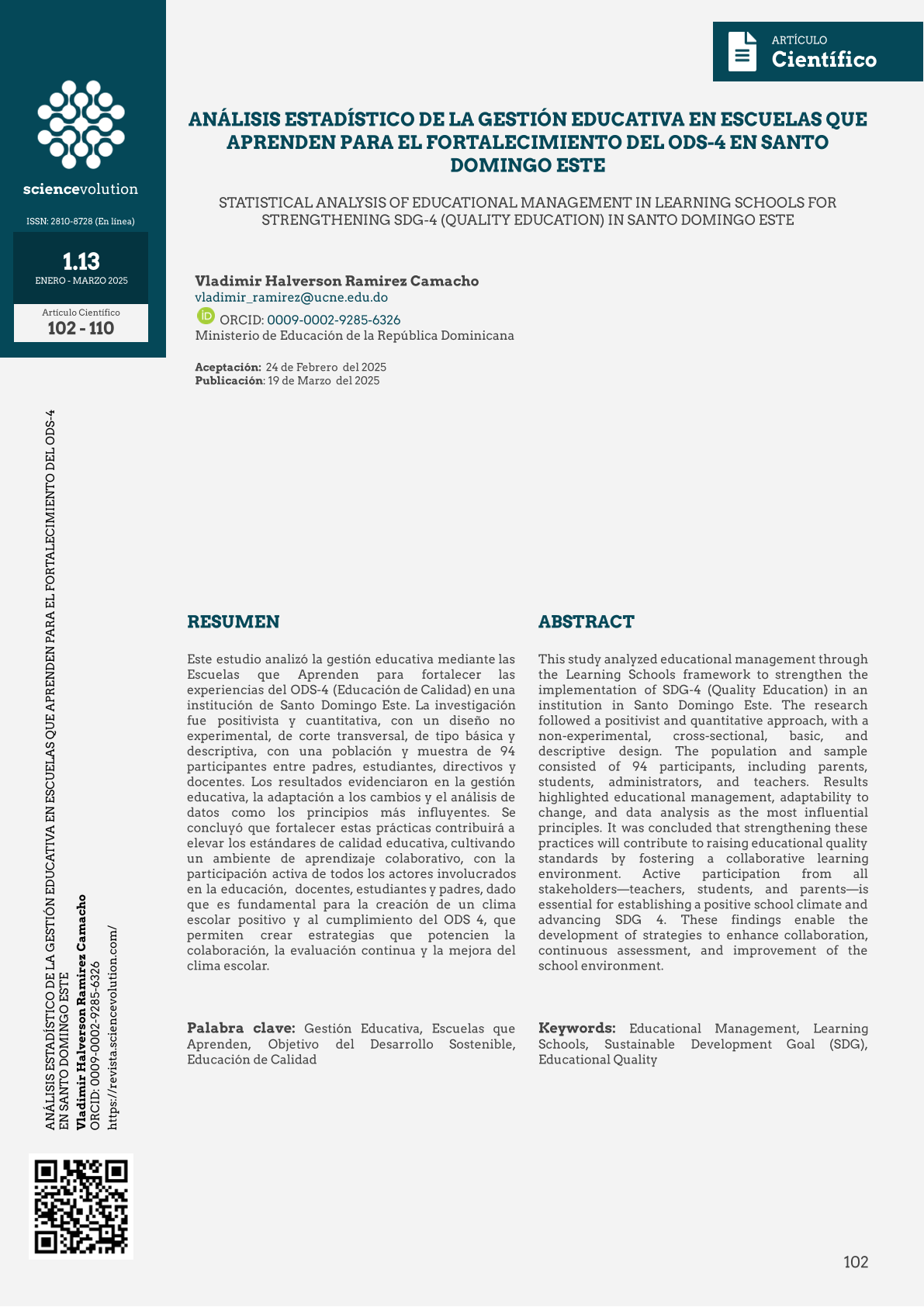Abstract
This study analyzed educational management through the Learning Schools framework to strengthen the implementation of SDG-4 (Quality Education) in an institution in Santo Domingo Este. The research followed a positivist and quantitative approach, with a non-experimental, cross-sectional, basic, and descriptive design. The population and sample consisted of 94 participants, including parents, students, administrators, and teachers. Results highlighted educational management, adaptability to change, and data analysis as the most influential principles. It was concluded that strengthening these practices will contribute to raising educational quality standards by fostering a collaborative learning environment. Active participation from all stakeholders—teachers, students, and parents—is essential for establishing a positive school climate and advancing SDG 4. These findings enable the development of strategies to enhance collaboration, continuous assessment, and improvement of the school environment.
References
Álvarez, Q. (2017). Pedagogía sistémica e interculturalidad: Claves para construir un aula inclusiva. Revista Lusófona de Educação, 37,165-179. https://revistas.ulusofona.pt/index.php/rleducacao/article/view/6237
Carriazo Diaz, C., Perez Reyes, M., & Gaviria Bustamante, K. (2020). Planificación educativa como herramienta fundamental para una educación con calidad. / Educational planning as a fundamental tool for quality education. Utopía Y Praxis Latinoamericana, 25(1), 87-95. https://produccioncientificaluz.org/index.php/utopia/article/view/32643
Foro Socioeducativo. (2017). Boletín no. 17: El ODS 4 en República Dominicana: Articulación con la agenda educativa nacional. La ejecución presupuestaria del MINERD en el primer año de la Agenda 2030. https://www.intered.org/sites/default/files/boletin_17_fse_ods4.pdf
Jiménez, A., González, L., & Tornel, M. (2018). La formación continua de los docentes de educación básica infantil. Revista Científica Internacional, 4(1), 45-60. Recuperado de https://www.redalyc.org/journal/5860/586068493005/html/
García, J. A.; Cerdas, V. & Torres, N. (2018). Gestión curricular en centros educativos costarricenses: Un análisis desde la percepción docente y la dirección. Revista Electrónica Educare, 22(1), 1-28. https://doi.org/10.15359/ree.22-1.11
García-Vallès, X. (2020). Delimitación del perfil competencial inclusivo necesario en la formación inicial en los grados de educación primaria. Innovaciones Educativas, 22(32), 51-64. https://doi.org/10.22458/ie.v22i32.2830
Hernández, R. (2018). Metodología de la investigación. México D.F.: McGraw-Hill Education. https://doi.org/10.22201/fesc.20072236e.2019.10.18.6
Hernández Sampieri, R, Fernández, C & Baptista, P. (2014). Metodología de la Investigación. México D.F, México: McGraw-Hill.
Herrera Rodríguez, J. I. (2018). Las prácticas investigativas contemporáneas. Los retos de sus nuevos planteamientos epistemológicos. Revista Scientific, 3(7), 6–15. https://doi.org/10.29394/Scientific.issn.2542-2987.2018.3.7.0.6-15
Johnson, D. W., & Johnson, R. T. (2021). Cooperation and competition: Theory and research (2.ª ed.). Interaction Book Company.
Martínez Iñiguez, J. E., Tobón, S., López Ramírez, E., y Manzanilla Granados, H. M. (2020). Calidad educativa : un estudio documental desde una perspectiva socioformativa. Latinoamericana de Estudios Educativos, 16(1), 233–258. https://revistasojs.ucaldas.edu.co/index.php/latinoamericana/article/view/2296
Meza-Cueto, L.; Abuabara-Moya, N.; Pontón-Villareal, D.; Ortega-Mercado, F. & Stave-Mendoza, F. (2020). Factores personales de la resiliencia y desempeño académico de escolares en contexto de vulnerabilidad. Búsqueda, 7(24), e491. https://doi.org/10.21892/01239813.491
Asamblea General de las Naciones Unidas. (2015). Transformar nuestro mundo: la Agenda 2030 para el Desarrollo Sostenible (Resolución A/RES/70/1). https://unctad.org/system/files/official-document/ares70d1_es.pdf
Orozco Solís, M., Colunga, B., Bravo, H., Ruvalcaba, N., Vázquez, C. & Palos, M. (2020). Elementos que configuran la percepción de seguridad escolar en estudiantes de secundaria. Psicología. Avances de la Disciplina, 14(1), 85-97. https://doi.org/10.21500/19002386.4376
Pedrero-García, E., Fernández, O. & Moreno P. (2017). Educación para la diversidad cultural y la interculturalidad en el contexto escolar español. Revista de Ciencias Sociales, 23(2), 11-26. https://doi.org/10.31876/rcs.v23i2.24949
Ripoll-Rivaldo, M. (2021). Prácticas pedagógicas en la formación docente: desde el eje didáctico. Telos,.23(2), 285- 300. https://doi.org/10.36390/telos232.06
Senge, P. M. (2019). Escuelas que aprenden: Un manual de la quinta disciplina para educadores, padres de familia y todos los que se interesen en la educación (2.ª ed.). Editorial Norma.

This work is licensed under a Creative Commons Attribution-NonCommercial-NoDerivatives 4.0 International License.

